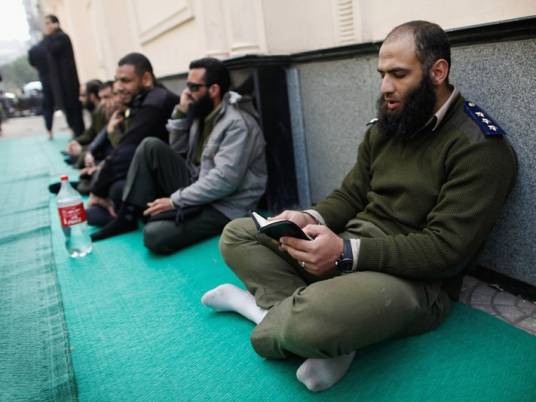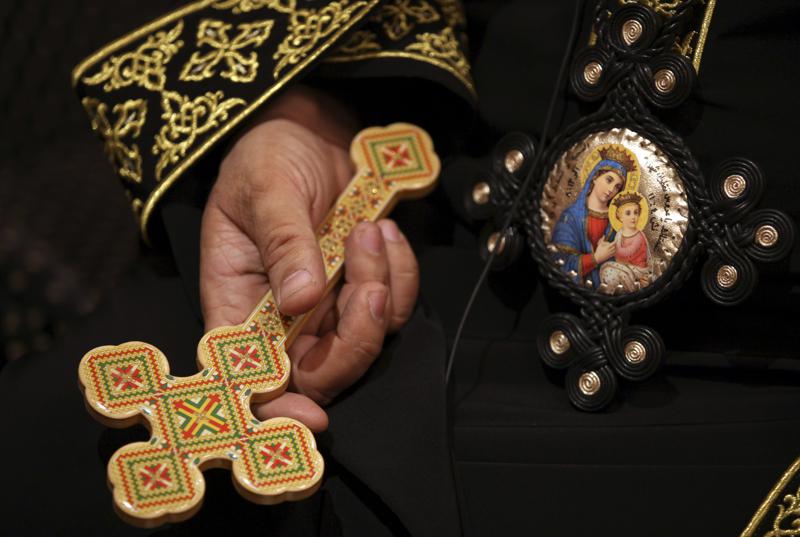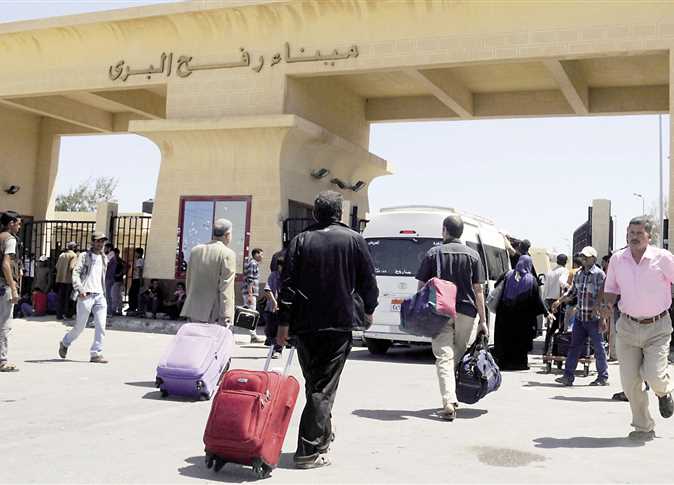
Unlike the usual “million-man” rallies organized by Islamists, there were barely 500 people taking part in the protest held by bearded policemen this past Friday in the Cairo district of Abdeen.
There were, however, posters similar to the ones found at these mass rallies, announcing the support of a number of Salafi political parties, such as the Nour and Raya parties.
The bearded policemen are demanding that they be allowed back to work without being made to shave their beards. The individuals who came out in support of the officers at Friday’s protest were themselves predominantly male and bearded.
Some had stickers on their heads or shoulders with the Islamic declaration that there is “No god but Allah, and Mohamed is His messenger.”
Next to the podium, a huge poster bore the image of one of the bearded officers next to words of support from prominent Salafi figures. Former MP and Jama’a al-Islamiya lawyer Mamdouh Ismail — famous for an impromptu call to prayer during a People’s Assembly session — told the protest that the bearded policemen’s fight was “a struggle between an old, secular state and a new, Islamic one.”
The statement in itself reflects the polarized dynamic playing out in the political sphere between Islamists and liberals.
First Lieutenant Ahmed Hamdy described the group as a “family” within the Interior Ministry.
While their sit-in outside the ministry is now in its second week, the bearded policemen’s fight began immediately after the 25 January revolution when, Hamdy says, they demanded that the ministry allow them to grow their beards.
“The Interior Ministry ignored our demand for a year until February 2012, when we began growing our beards. This is when the harassment by the Interior Ministry started,” Hamdy says.
When this didn’t work, the Interior Ministry attempted to “tempt us with worldly things such as paid holidays so that we would rest a bit and go back to work.
“We didn’t accept this because we are not mentally ill and don’t need a holiday. Afterwards, they offered to allow us to choose where we are posted in exchange for us letting go of the beard issue,” Hamdy says.
He alleges that Interior Ministry figures threatened police officers that their futures would be ruined if they continued with the cause, and went as far as telephoning their families to put pressure on them.
In mid-2012, then-Interior Minister Mohamed Ibrahim suspended them for a month and sent them to a disciplinary tribunal before putting them on inactive duty — an action that effectively renders them suspended from work.
When a police officer is put on inactive duty, usually for two years, he is paid only a basic salary before the case is reexamined and a decision is made to either reinstate the officer or send him to early retirement, with approval from the minister. This mechanism is typically used when a policeman has health problems or in cases connected to national security.
As for disciplinary tribunals, they are held when a policeman commits a violation in the course of his work. These tribunals can impose punishments ranging from docking a day’s pay to expulsion from the police force.
The bearded policemen have raised 29 cases against the Interior Ministry alleging that the decision to send them to inactive duty was unlawful.
The Administrative Court last May found in favor of the policemen in four cases, ruling that the decision to send them to inactive duty was unlawful and that the plaintiffs should be reinstated to their posts.
On 4 June, it ruled in favor of the Interior Ministry in three cases, while 22 other cases remain before the court.
The Supreme Administrative Court rejected the ministry’s appeal of the four verdicts in favor of the policemen. Considering it a victory, the policemen began holding protests in front of the Interior Ministry, including a sit-in held under the slogan, “Respecting the court’s decision upholding the right to work with a beard.”
One of these protests, however, witnessed fistfights between the bearded policemen and other policemen, indicating a possible internal schism.
The ministry, meanwhile, denies that any final court decision has been handed down in the case, saying in a statement that “the Interior Ministry has not been officially notified of any court verdicts or instructions to implement a court verdict. … When the Interior Ministry is notified of such a verdict, it will take the necessary legal measures to implement [it].”
The reasoning of the court on the relationship between policemen’s beards and preserving general order within the Interior Ministry differs. The Cairo Administrative Court’s verdict in favor of the ministry held that beards caused discord among officers’ ranks, and may compromise their ability to uphold law and order.
The Alexandria Administrative Court said in its judgment that the decision to send a policeman to inactive duty is only permissible in cases of gross violations, necessitating immediate suspension from duty without taking the usual disciplinary measures.
Nasser Amin, director of the Arab Center for the Independence of the Judiciary and the Legal Profession, tells Egypt Independent that verdicts handed down by the Administrative Court in cases concerning government institutions apply only to the plaintiff and cannot be the basis for a general precedent.
Amin adds that the Supreme Administrative Court has not pronounced on the merits of the case — that is, whether policemen have the right to grow their beards.
“The court ruled on an administrative matter concerning the rule that nobody should be punished twice for the same crime. What happened is that people brought a case before the administrative court challenging the interior minister’s decision to suspend them because they had previously been sent to a disciplinary tribunal. In the media, however, [the bearded policemen] claimed that the court ruled in favor of them growing their beards,” Amin explains.
Adel Ramadan, a lawyer with the Egyptian Initiative for Personal Rights, agrees, saying that the Supreme Administrative Court’s judgment did not touch on the merits of the case, but rather was restricted to an examination of procedural issues.
Ramadan stresses that the Interior Ministry should have waited for the results of the disciplinary tribunal before taking any decision to send policemen to inactive duty. As a result of the court verdicts, he adds, the ball is now in the Interior Ministry’s court.
Ramadan attributes the disparity in court verdicts on the issue to a lack of clarity in the law, and, in particular, subjective phrases such as “preserving public order.”
Beards as symbols?
Some speculate that the bearded officers’ movement is a way for more hardline Islamists to gain ground within state institutions.
Mohamed Mahfouz, a former police officer and assistant secretary general of the Officers but Honorable Coalition, describes the bearded policemen movement as a “Salafi Trojan horse” and a means of establishing Salafi influence within the ministry. This, he adds, is part of a greater goal of competing with the Brotherhood for influence within state institutions.
Mahfouz believes there is competition between Islamists for power within state institutions. This began years ago when State Security Investigations employed Salafi groups to act as a foil to the Muslim Brotherhood, which during former President Hosni Mubarak regime acquired a popular following, he argues.
Mahfouz describes the bearded policemen movement as a “tool for pressure” on the Brotherhood, as well as a way of realizing Salafi penetration of the Interior Ministry.
“Control of the Interior Ministry is crucial, of course, for anyone who wants to control the arms of the state” Mahfouz adds.
While Mahfouz expresses respect for personal freedoms, he also points to the need to be cautious about groups with political objectives penetrating state institutions. He questions the source of the policemen’s funding.
“In political Islam, a beard has political meaning — it is not merely facial hair. It is a form of propaganda for a type of Islam that regards the faith as both religion and state.
“This is the danger of the beard. We can’t fool ourselves about this — the beard has political connotations,” he says.
Pictures of the bearded policemen in their uniforms have elicited a strong response from individuals opposed to the policemen’s cause on the grounds that the men represent a form of extremist, conservative Islam whose tenets they will uphold while performing their duties.
It has even been alleged that these men will act as Islamic morality police of the type employed in Saudi Arabia.
Hamdy rejects this.
“To people who ask what the bearded policemen will do to Christians, I say, what about Christians who go to bearded doctors or judges? Or what about Christian policemen sent to deal with bearded civilians? Why does nobody say anything about that?” Hamdy says.
Several policemen at Friday’s protest underlined that their morals would stay the same, with or without a beard. They also questioned why they were being challenged when Christian policemen with crosses tattooed on their wrists are allowed to serve.
Hamdy denies any relationship between Islamic powers and the bearded policemen other than the ordinary support offered by Egyptian parties to citizens who have rights.
He adds that the policemen have nothing to do with the political party logos and chants witnessed during protests.
“It’s the duty of all Islamic parties and liberal parties who call for personal rights and freedoms, and of everyone who respects judicial verdicts to support us,” Hamdy says.




